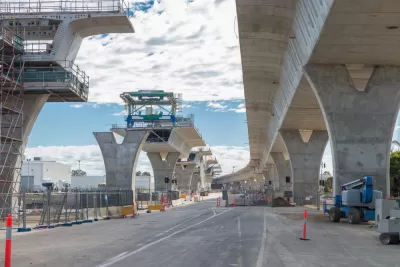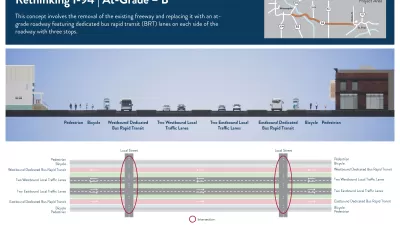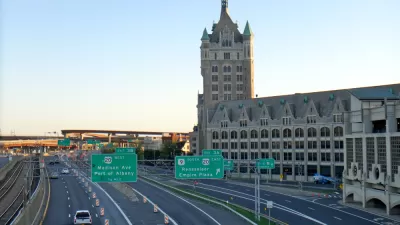The federal Reconnecting Communities program is aimed at supporting highway removal and reversing the damage caused by rampant freeway construction, but some watered down proposals from state agencies could fund road expansion instead.

Competing proposals from lawmakers and state departments of transportation raise questions about how the Biden administration will approach evaluating applications for the Reconnecting Communities Act, which promises $1 billion in federal funding for freeway removal projects.
Writing in Route Fifty, Daniel C. Vock outlines two high-profile examples of cities where activists have been pushing for highway removals, including the infamous Claiborne Expressway in New Orleans. “The story of the Claiborne Expressway is so poignant that the Biden administration referenced it when the president unveiled the idea for Reconnecting Communities,” Vock writes. Yet some transportation officials are backing off removal proposals, expressing concern about the cost of removing freeways, which, in some cases, would surpass the federal funding available. As Vock explains, “The Reconnecting Communities program was cut from $20 billion in Biden’s original proposal to $1 billion in the five-year infrastructure law.”
In some cases, state DOTs want to make aesthetic improvements to existing highways or mitigate the damage of further road expansion with freeway caps and other amenities rather than commit to full highway removal. The Louisiana Department of Transportation has submitted an application for “a $95 million plan that includes the removal of up to four ramps, neighborhood enhancements and expressway improvements,” citing concerns about not only cost, but also the impact of removing the viaduct on local freight and the geo-technical considerations involved in tunneling in the Louisiana soil.
FULL STORY: With $1B at Stake, Clashes Emerge Over Highway Removal

Planetizen Federal Action Tracker
A weekly monitor of how Trump’s orders and actions are impacting planners and planning in America.

Congressman Proposes Bill to Rename DC Metro “Trump Train”
The Make Autorail Great Again Act would withhold federal funding to the system until the Washington Metropolitan Area Transit Authority (WMATA), rebrands as the Washington Metropolitan Authority for Greater Access (WMAGA).

The Simple Legislative Tool Transforming Vacant Downtowns
In California, Michigan and Georgia, an easy win is bringing dollars — and delight — back to city centers.

The States Losing Rural Delivery Rooms at an Alarming Pace
In some states, as few as 9% of rural hospitals still deliver babies. As a result, rising pre-term births, no adequate pre-term care and "harrowing" close calls are a growing reality.

The Small South Asian Republic Going all in on EVs
Thanks to one simple policy change less than five years ago, 65% of new cars in this Himalayan country are now electric.

DC Backpedals on Bike Lane Protection, Swaps Barriers for Paint
Citing aesthetic concerns, the city is removing the concrete barriers and flexposts that once separated Arizona Avenue cyclists from motor vehicles.
Urban Design for Planners 1: Software Tools
This six-course series explores essential urban design concepts using open source software and equips planners with the tools they need to participate fully in the urban design process.
Planning for Universal Design
Learn the tools for implementing Universal Design in planning regulations.
Smith Gee Studio
City of Charlotte
City of Camden Redevelopment Agency
City of Astoria
Transportation Research & Education Center (TREC) at Portland State University
US High Speed Rail Association
City of Camden Redevelopment Agency
Municipality of Princeton (NJ)





























